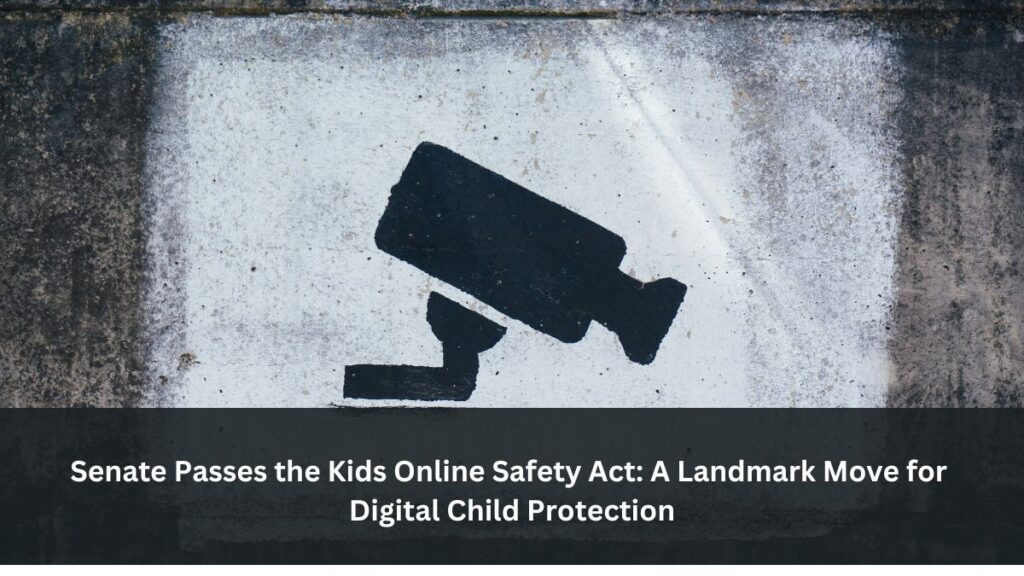In a historic vote, the Senate has passed the Kids Online Safety Act (KOSA) and the Children and Teens’ Online Privacy Protection Act, colloquially known as COPPA 2.0. This marks a significant milestone in internet legislation aimed at safeguarding minors. With a decisive 91-3 vote, the bill now heads to the House of Representatives for further consideration. This article explores the implications, controversies, and potential impact of this landmark legislation.
The Significance of KOSA and COPPA 2.0
A New Era of Child Protection Online
The passage of KOSA, alongside COPPA 2.0, represents the most comprehensive effort in two decades to protect children on the internet. Senate Majority Leader Chuck Schumer heralded the vote as a “momentous day,” emphasizing the commitment of lawmakers to address the severe risks associated with social media. He urged the House to act swiftly, reflecting a sense of urgency shared by many advocates.
KOSA is designed to impose a legal duty of care on online platforms used by minors. It mandates that these platforms implement “reasonable” measures to counteract various harms, including cyberbullying, sexual exploitation, drug promotion, and eating disorders. The bill aims to create a safer digital environment by compelling platforms to redesign their products with child safety in mind.
COPPA 2.0 extends the protections of the original Children’s Online Privacy Protection Act of 1998 to cover individuals under 17, expanding privacy safeguards and banning targeted advertising to minors. Senator Ed Markey, a lead sponsor of COPPA 2.0, highlighted that the original law had been insufficient given the evolution of technology and the growing risks faced by children online.
Key Provisions and Safeguards
KOSA introduces several provisions to enhance online safety for minors:
– Duty of Care: Platforms are required to take reasonable steps to prevent online bullying, exploitation, and other harms. They must also make it easy for minors to opt out of personalized recommendations.
– Privacy Controls: Default privacy settings for minors’ accounts will be set to the strictest level, and platforms must provide tools for parents to monitor and control their children’s online activities.
– Parental Controls: Enhanced parental control tools will enable parents to restrict their children’s purchases, limit screen time, and manage privacy settings.
COPPA 2.0 updates the original law by broadening its scope to include users up to 17 years old, reflecting the growing recognition of the need for extended protections as children age. The ban on targeted advertising aims to shield minors from manipulative marketing tactics.
Controversies and Criticisms
Concerns from Digital Rights and Free Speech Advocates
Despite the widespread support for KOSA and COPPA 2.0, the bills have not been without controversy. Critics argue that the legislation could inadvertently harm marginalized groups and stifle free expression online. Organizations such as the American Civil Liberties Union (ACLU) and Electronic Frontier Foundation (EFF) have voiced concerns that the duty of care could lead to excessive content filtering. They fear that platforms might overly restrict access to valuable information and resources to avoid potential liability.
Senator Ron Wyden expressed concerns that the bill might be used to censor essential information, including privacy technologies like encryption. Such measures could have unintended consequences, potentially affecting online freedom and privacy.
The Debate Over Content and Age Verification
Critics also worry about the potential for the legislation to lead to aggressive age verification systems. These systems could raise significant privacy and constitutional issues. The legislation’s critics, including some senators, have pointed out that age verification measures might create additional hurdles for users and infringe upon their privacy rights.
Moreover, the inclusion of mental health definitions in the bill has sparked debate. Some fear that KOSA could be used to limit access to information on sensitive topics, such as transgender health. While the bill specifies that it references the Diagnostic and Statistical Manual of Mental Disorders (DSM) for mental health definitions, critics worry that it could be exploited to restrict valuable content.
The Path to the House
The bills now face scrutiny in the House of Representatives, which recently adjourned a week early. House Speaker Mike Johnson has expressed a commitment to reviewing the legislation and working towards consensus. However, the path forward may be challenging, particularly given the political climate and the proximity to the presidential election.
If KOSA and COPPA 2.0 become law, they will likely face legal challenges. NetChoice, a trade association representing major tech platforms, has a history of contesting similar laws. These challenges could test the legislation’s resilience against claims that it infringes on free speech and other constitutional rights.
A Critical Moment for Digital Child Protection
The Senate’s passage of KOSA and COPPA 2.0 marks a significant step towards enhancing online safety for minors. While the legislation holds promise for creating a safer digital environment, it also raises important questions about privacy, free speech, and the balance between protection and censorship.
As the bills move to the House and potentially face legal scrutiny, it will be crucial to monitor their progress and impact. The ongoing debate highlights the complexities of regulating digital spaces and the need to carefully navigate the challenges of protecting children while preserving essential freedoms.
Ultimately, this legislative effort underscores the growing recognition of the need to address online risks to minors. It serves as a reminder of the importance of creating a safe and supportive digital environment for the next generation, while also respecting fundamental rights and freedoms.
In the end, the real test will be in how these laws are implemented and whether they achieve their goals without unintended negative consequences. As we await further developments, it is essential to stay engaged and informed about how these critical issues unfold in the coming months.

